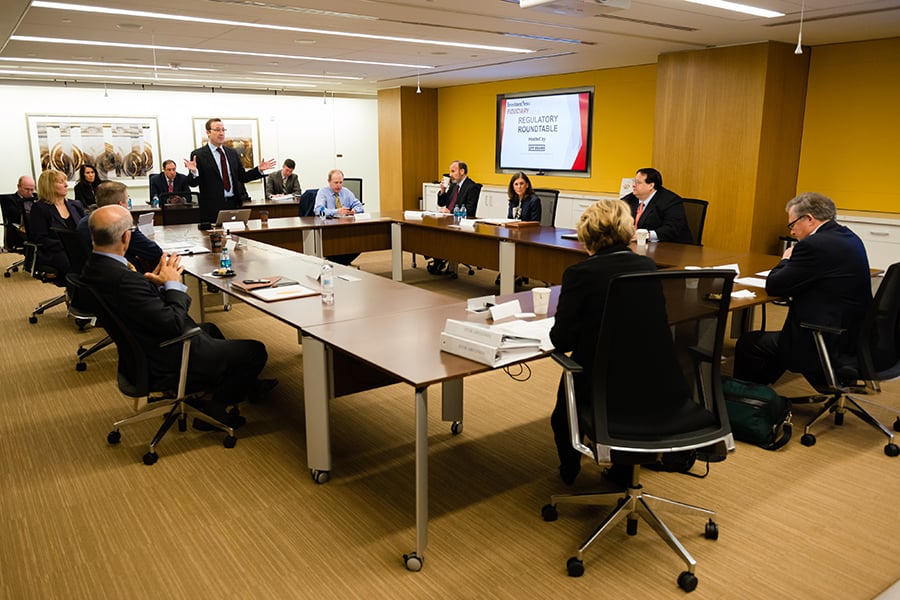The final version of a Labor Department investment-advice rule released last week contains enough changes that opponents are stepping back to absorb the revisions, but they're likely to resume their fight against the measure.
Advocates for the rule say the revisions have helped ensure that it fulfills its central purpose — requiring advisers to act in the best interests of their clients in 401(k) and individual retirement accounts — while protecting it from legislative and court challenges.
These opposing views were aired at an
InvestmentNews regulatory roundtable on Friday conducted at the Washington headquarters of the Certified Financial Planner Board of Standards Inc.
(More: Coverage of the DOL rule from every angle)
When the
rule was released last Wednesday, the National Association of Insurance and Financial Advisors praised the DOL for making several modifications to the rule that the group had sought, including in the way a major exemption works to ensure that advisers have flexibility in the way they are paid.
But the group is not necessarily going to make a 180-degree turn and support the rule, which it is reviewing and previously characterized as too complex and costly.
“We have a government with three branches, and we can certainly utilize all three in order to get things done,” NAIFA chief executive Kevin Mayeux said at the roundtable. “Our strength is more in the grass-roots impact we have in the legislative branch. We'll be continuing to review our options with our elected representatives in the U.S. Congress.”
His comments
alluded to legislation that has been introduced that would halt the rule and replace it with a fiduciary standard of care written by lawmakers.
Congress also has 60 legislative days to pass a resolution that kill the rule. Both efforts are likely to be vetoed by the measure's biggest backer, President Barack Obama.
Another likely avenue of attack is a lawsuit by financial-industry interest groups. The Chamber of Commerce has not yet decided whether to take action in court, according to David Hirschmann, president and chief executive of the Chamber's Center for Capital Markets Competitiveness.
“Even in a lawsuit, if there is one somebody files, the goal is not necessarily to cancel out the rule,” Mr. Hirschmann said at the roundtable. “Sometimes the goal of a lawsuit is to force an agency to fix fundamental problems with the rule.”
The
changes that the DOL made to the rule improved it and insulated it against attacks, said David Certner, legislative counsel and director of legislative policy, at AARP.
“It's going to be more helpful to have a rule that is really a little bit simpler and cleaner than the initial proposed rule and I think it will, therefore, be easier to implement and withstand challenges in court and in Congress,” Mr. Certner said.
The Insured Retirement Institute is reviewing the rule to determine how it will impact products that deliver lifetime guaranteed income, such as annuities.
“Is there a clear pathway for commission-based transactions?” Ms. Weatherford said. “Can that still be part of a holistic [retirement] plan? That's where we're going to be digging in.”
Marilyn Mohrman-Gillis, CFP Board managing director for public policy and communications, said that the final rule clarified that commissions are not banned. She also pushed back against charges that advice will become more prohibitively expensive for investors with modest assets.
“What you're going to see is innovation and adaptation in the marketplace,” Ms. Mohrman-Gillis said. “The future is technology-enabled advice. Human advice is not going to go away.”
A practitioner who participated in the roundtable said that the DOL did a good job of crafting a rule that is practical while changing an advice landscape in which investments costs can be opaque.
“Any evaluation of the rule has to be done in the context of the status quo,” said Scott Puritz, managing director of Rebalance IRA. “What we see every day in the marketplace is very suboptimal. Market mechanisms simply are not working.”
But a fiduciary advocate said that DOL went too far in reducing disclosure requirements to accommodate industry concerns.
“The single best way to increase investor trust has been rejected by the rule, and that's transparency in fees and expenses,” said Knut Rostad, president of the Institute for the Fiduciary Standard.
Updates earlier version to correct the spelling of NAIFA chief executive Kevin Mayeux's last name.







